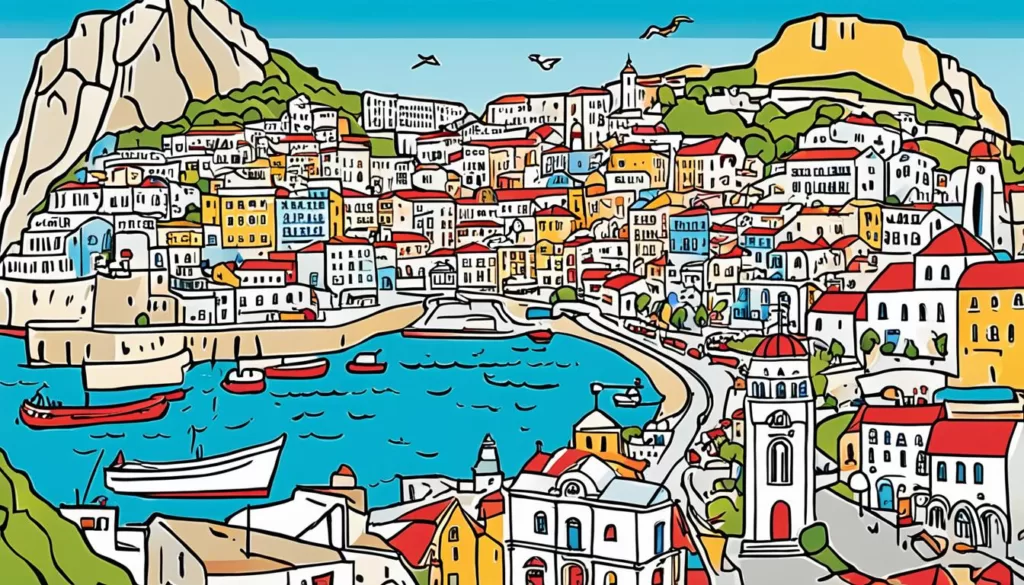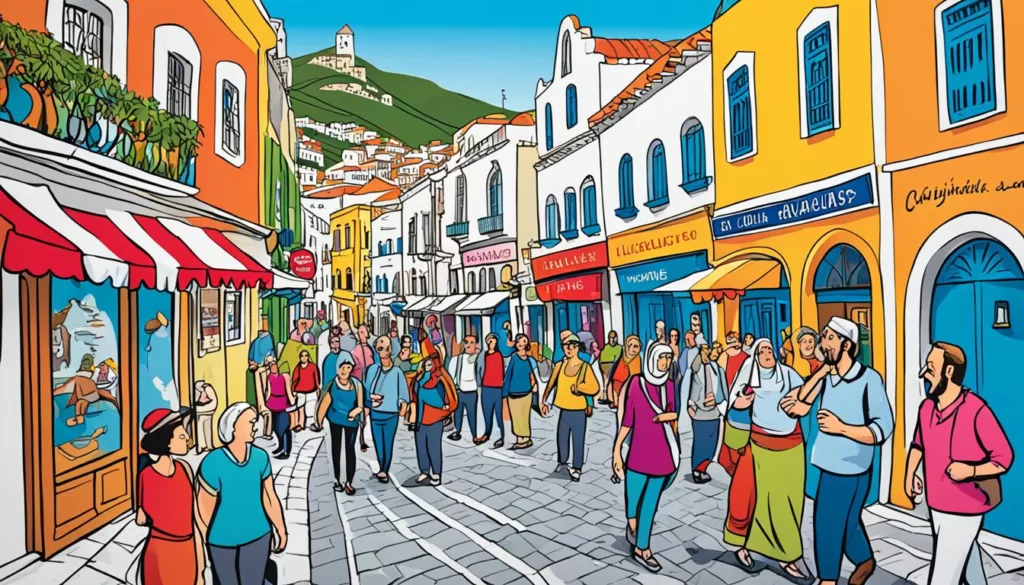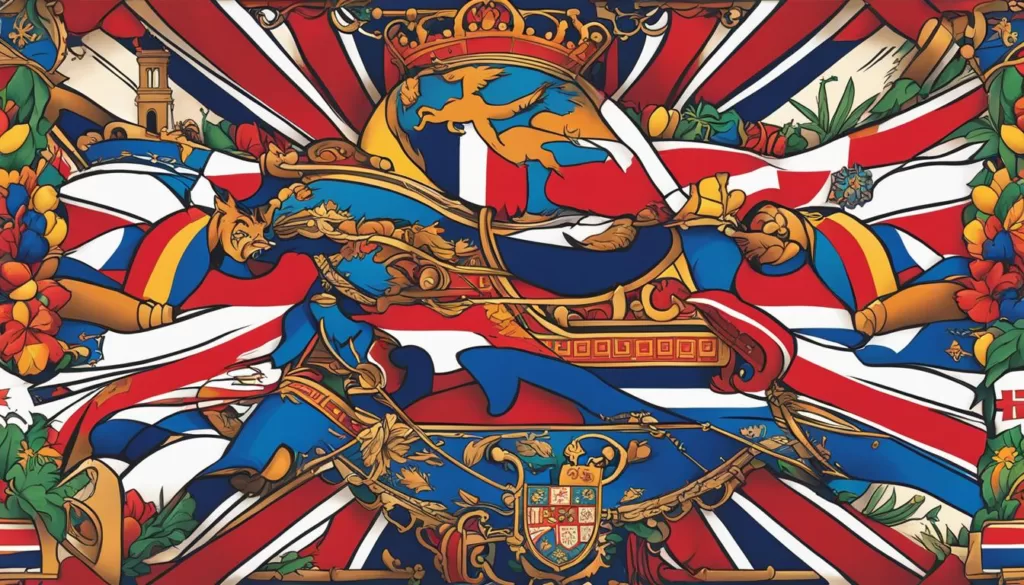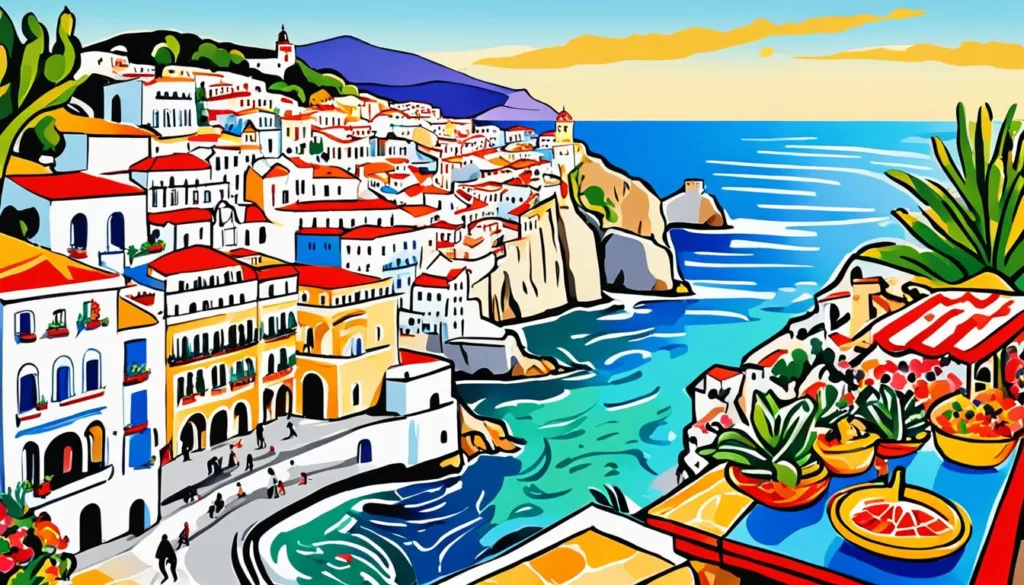Stepping into Gibraltar, one is immediately enveloped in a soundscape as diverse as the territory’s storied history. The language diversity in Gibraltar is a testament to its role as a gateway between continents, a melting pot of cultures where linguistic borders are as fluid as the waters surrounding this bustling British overseas territory. From streets lined with English and Spanish signs to the lively informal exchanges in the local vernacular, Gibraltar language statistics reveal a people comfortably conversing in a range of languages that reflect their rich cultural tapestry.
With the Rock of Gibraltar standing resilient against the tides of history, the languages spoken here offer insight into the evolution of a society at the crossroads of Europe and Africa. In this diverse linguistic climate, the harmonious coexistence of tongues—from the dominant English and Spanish to the unique Llanito and the hues of minority languages—is a fascinating study in cultural convergence and linguistic resilience.
Key Takeaways
- Gibraltar’s official language is English, showcasing its ties to the United Kingdom.
- Language diversity in Gibraltar is highly influenced by its unique location between Europe and Africa.
- Residents of The Rock often demonstrate bilingualism or multilingualism, particularly in English and Spanish.
- Llanito, a blend of Andalusian Spanish and English, is a distinct linguistic symbol of Gibraltar’s cultural identity.
- Minority languages like Moroccan Berber, Moroccan Arabic, and Hindi add to the rich language tapestry present in the territory.
- The harmonious linguistic variety in Gibraltar reflects the region’s historical layers and diverse cultural heritage.
The Official Language of Gibraltar: English
Within the vibrant contours of Gibraltar lies a profound linguistic constant, the English language, serving as the official medium of communication and administration. This linchpin of Gibraltarian society underscores the territory’s unwavering connection to the United Kingdom, permeating through governmental proceedings, educational frameworks, and media landscapes.

While the native Gibraltarian dialect exhibits the quintessential British English foundation, it is the distinct Gibraltarian English accent that reveals a rich tapestry of cultural interweavings. This local parlance delivers more than mere communication; it carries the imprints of a diverse linguistic heritage of Gibraltar, having been shaped by a pastiche of ethnic migratory patterns.
A Closer Look at English Usage in Gibraltar
As the hands of time have drawn various peoples to its shores, English usage in Gibraltar has evolved to be emblematic of its societal functions. English envelops the bustling streets, government buildings, and schoolyards, asserting its role as an essential facet of daily Gibraltarian life. Its utilization conveys not only practicality but also a symbol of historical continuity and global connectivity.
Gibraltarian English Accent and its Unique Characteristics
The Gibraltarian English accent is a melodic testament to the enclave’s historical psyche, a fascinating convergence of sounds that maps the cultural and linguistic nexus between Britain and the Iberian Peninsula. The tones of this distinctive English dialect bear the subtleties of intonation and rhythm peculiar to Gibraltar, making it as much a part of the local scenery as the iconic Rock itself.
Languages Spoken in Gibraltar: A Melting Pot of Cultures
The language diversity in Gibraltar epitomizes its rich and complex heritage as a cultural crossroads. The peninsula paints a vivid linguistic landscape where the sound of two continents converges, making multilingualism in Gibraltar an everyday norm. Here, a simple walk down Main Street is a journey through a kaleidoscope of dialects and accents, from the vibrant banter of market traders to the formal discourse within governmental buildings.

In this enclave of linguistic plurality, Gibraltarians seamlessly navigate an array of languages with adept code-switching, embodying an exceptional linguistic agility. Their daily interactions are a symphony of tongues in harmonious coexistence—English, Spanish, and an array of ethnic dialects echo through the labyrinthine alleys and bustling squares.
Reflecting on the profound multicultural influence, Gibraltar’s language scene defies the simplicity of labels, thriving on the spontaneous exchange between people, trade, and cultures. This dynamic interplay of languages is not just a facet of the Gibraltarian way of life—it is the lifeblood of their identity and a mirror to the territory’s layered history and the international fabric that weaves it together.
- A blend of English proficiency and Spanish fluency is commonplace, reflecting the territory’s British sovereignty and Iberian proximity.
- English serves as the lingua franca for administration and education, while Spanish pervades in personal and social spheres.
- Gibraltarians often punctuate their English conversations with Spanish terms, or vice versa, producing a unique interlingual tapestry.
- Other languages, indicative of the historical footprint of various ethnic groups on the Rock, further enrich this multicultural mosaic.
The linguistic complexity within this small yet significant outcrop of land is a testament to its inhabitants’ adaptability and inclusiveness. Gibraltar stands as a pulsating hub of multilingualism, where languages are not barriers but bridges connecting its storied past to a cosmopolitan present and a cohesive, globally oriented future.
Llanito: The Cultural Linguistic Identity of Gibraltar
At the heart of Gibraltarian society lies Llanito, a language representing much more than a means of communication—it is the essence of Gibraltar’s cultural identity. This linguistic phenomenon, with its origins deeply rooted in Gibraltar’s multicultural landscape, serves as a living symbol of the community’s heritage and socio-linguistic unity.

Origins and Influence of Llanito on Gibraltarian Society
Beyond the British English and Andalusian Spanish that weave through the fabric of everyday life in Gibraltar, Llanito emerges as a vibrant tribute to the territory’s diverse ethnic makeup. It bears the hallmarks of Gibraltar’s linguistic heritage, influenced by the mingling of languages and cultures from Genoese sailors, Portuguese merchants, to the Jewish community speaking Haketia.
In the context of language policy in Gibraltar, Llanito plays an unscripted role. Unlike the official platform maintained for English, Llanito thrives organically, painting a vivid socio-linguistic picture of the Gibraltarian dialect and identity. As a critical emblem of the distinctiveness of Gibraltar amidst broader political dialogues, Llanito stands as a testament to the territory’s autonomy and resilience in cultural self-expression.
Understanding Llanito: A Mix of Andalusian Spanish and English
Llanito’s charm lies in its dynamic composition—a spontaneous and nuanced amalgamation of primarily Andalusian Spanish enriched with the lexicon of British English. This Gibraltarian dialect reflects the historical closeness and continuous interaction between Gibraltar and the neighbouring Spanish regions, intertwined with the undeniable British influence over the centuries.
The following table provides a snapshot of common Llanito phrases, illustrating its unique blend of English and Spanish components:
| Llanito Phrase | English Translation | Spanish Equivalent |
|---|---|---|
| Ponme un chips dish. | Give me a dish of fries. | Dame un plato de patatas fritas. |
| Vamos al shopping for clothes. | Let’s go shopping for clothes. | Vamos a comprar ropa. |
| He’s working too hard lately. | He’s been working too hard lately. | Últimamente está trabajando mucho. |
| Pass me the control, please. | Pass me the remote, please. | Pásame el mando, por favor. |
The fluid code-switching and innovative use of loanwords in Llanito not only showcase the linguistic creativity of Gibraltarians but also illuminate how language evolves to adapt to the speakers’ realities. As Gibraltar continues to navigate its unique geopolitical landscape, Llanito remains a vibrant marker of Gibraltarian identity, immortalizing the intangible yet steadfast inheritance of its people’s ancestral voices.
Spanish in Gibraltar: A Historical and Modern Perspective
Traversing the narrative of Gibraltar’s linguistic odyssey, one cannot overlook the profound impact of Andalusian Spanish on the territory’s cultural and social dynamics. This romance language bears the imprints of Gibraltar’s storied past, echoing centuries of geopolitical shifts and the everyday lives of its people. It is a testament to the interplay of history with the present, where the language policy in Gibraltar plays a significant yet nuanced role, favoring English officially while embracing the Spanish spoken by the masses.
Despite the dominance of English at an official level, Spanish remains an intrinsic part of Gibraltarian life, weaving through daily conversations, business exchanges, and cross-frontier interactions. The fortitude of Andalusian Spanish in Gibraltar’s societal fabric was further reinforced after the pivotal border re-opening with Spain in 1985, underscoring the inextricable links that tie the Rock to its Spanish neighbors.

The bilingual proficiency that characterizes many Gibraltarians today is not simply a practical skill but a cultural bridge—a syncretism of identities. Coalescing around the shared heritages and the modern tapestry of trade and kinship, Spanish and English in Gibraltar are less competing languages and more complementary tongues of a single, unified community.
In the bustling markets and lively schoolyards, languages aren’t mere tools for transaction, but threads woven into the broader societal fabric, shaping identities and connecting communities.
Fascination with the language policy in Gibraltar arises from the delicate balance the territory maintains, embodying both steadfast ties to its British sovereignty and an embrace of the Andalusian culture that envelops it. The result is a bilingual harmony, resonating through street signs, official documents, and the vivacious chatter among friends. This linguistic equilibrium is evident through an exploration of common societal interactions, presented in the table below:
| Context | English Utilization | Spanish Utilization |
|---|---|---|
| Government Procedures | Primary language for documentation and communication | Used informally among staff and for cross-border communications |
| Education System | Main language of instruction in schools | Taught as a second language; used in conversational practice |
| Local Commerce | Often used in branding and customer service | Widely spoken within the community and with Spanish visitors |
| Social Interactions | Commonly used, especially among the younger generations | Frequently interchanged with English, reflecting cultural duality |
The fusion of these languages has sparked a cultural renaissance, empowering Gibraltarians to continue defining their linguistic future. The story of Spanish in Gibraltar is one of resilience and adaptability—a chronicle mirrored in each bilingual sign, each code-switched conversation, and the harmonious coalescence of the Rock’s storied traditions with the bright pulse of its modern life.
Minority Languages: From Berber to Hindi
Gibraltar’s linguistic diversity is a rich tapestry, painted not just by its official and vernacular languages but also by a spectrum of minority tongues. The intricate layers of Gibraltar’s demographic composition bring forth an array of languages, each contributing its distinct thread to the cultural heritage of the territory. From the vibrant streets to the tranquil neighborhoods, the minority languages in Gibraltar echo the migrations, trade, and longstanding relationships that have shaped The Rock.
The Presence of Moroccan Arabic and Berber in Gibraltar
The proximity of Gibraltar to North Africa invites the melodic tones of Moroccan Arabic and Berber into its multicultural dialogue. These languages, primarily spoken by the Moroccan community — numbering in the hundreds — add depth to Gibraltar’s linguistic landscape. Moroccan Arabic, with its guttural richness, and Berber, with its ancient resonance, are more than mere sounds; they are symbols of Gibraltar’s geo-cultural connections. The Gibraltar language statistics reflect this diversity, pointing to the everyday reality of a community where diverse tongues coexist naturally.
Indian Languages in Gibraltar: Community and Culture
The subcontinental hues of Hindi and Sindhi are also essential colors in Gibraltar’s linguistic mosaic. Spoken by the Indian community, these languages bring the vibrancy of South Asian culture to The Rock. Each community maintains its language not just as a means of communication but as a preservation of their unique identities. Thus, the linguistic diversity in Gibraltar is not just a fact but a celebration of communities and cultures that enhance the territory’s global essence. In streets, homes, and places of worship, the harmonious blend of languages embodies the cultural richness of Gibraltar, enriching its history and heralding its future.
FAQ
What Languages are Spoken in Gibraltar?
In Gibraltar, the language landscape is varied. English is the official language and is used in government and education. However, the population is bilingual, with most locals fluent in both English and Spanish. Gibraltarians also speak Llanito, which is a mix of English, Andalusian Spanish, and other Mediterranean languages. Minority languages include Moroccan Arabic, Berber, and Hindi among others, reflective of the territory’s ethnolinguistic diversity.
Why Is English the Official Language of Gibraltar?
English is the official language of Gibraltar because of the territory’s British sovereignty. Governed by the UK since the early 18th century, English is used for all administrative and official purposes, including government, legal matters, and education. This aligns with Gibraltar’s legal and political institutions which are based on the British system.
What is the Gibraltarian English Accent?
The Gibraltarian English accent is distinct and incorporates aspects of British English, reflecting the region’s historical British influence. It also features elements from Andalusian Spanish and other languages due to Gibraltar’s unique cultural mix. The result is an accent that is uniquely Gibraltarian, emblematic of the territory’s rich linguistic heritage.
How Does Multilingualism Manifest in Gibraltar?
Multilingualism in Gibraltar is evident in the everyday life of its residents. It’s not uncommon for Gibraltarians to switch, or ‘code-switch’, between English and Spanish seamlessly in conversation. Additionally, many people are conversant in the languages of nearby countries and the various communities present within the territory, like Moroccan Arabic, Berber, and Hindi.
Can You Explain What Llanito Is?
Llanito is the colloquial dialect of Gibraltar, primarily arising from a mix of Andalusian Spanish and British English, but also containing elements from other Mediterranean languages, such as Genoese, Portuguese, and Haketia. It’s a unique socio-linguistic representation of Gibraltarian identity, enriched by the diverse cultural influences on The Rock.
How Has the Spanish Language Influenced Gibraltar?
The Spanish language has profoundly influenced Gibraltar’s culture and society. Due to its proximity to Spain and historical sovereignty shifts, Spanish has remained a significant language in Gibraltar. It is commonly spoken in informal contexts and has become interwoven with Gibraltarian English to create the hybrid dialect of Llanito.
What Role Do Minority Languages Play in Gibraltar?
Minority languages play an important role in maintaining and expressing the cultural identities of various communities within Gibraltar. Languages such as Moroccan Arabic and Berber are spoken by the Moroccan community, while Indian languages, such as Hindi, reflect the presence of the Indian community. The Jewish population adds to this linguistic diversity with languages like Hebrew. This multilingual environment contributes to Gibraltar’s rich cultural mosaic.
How is Language Diversity in Gibraltar Accommodated in Public Life?
Language diversity in Gibraltar is accommodated through its education system, where English is taught as the main language while Spanish is also widely prevalent. Public signage often includes both English and Spanish, and various cultural community centers provide resources and support for the use of minority languages. This reflects Gibraltar’s inclusive approach to its multilingual population.






